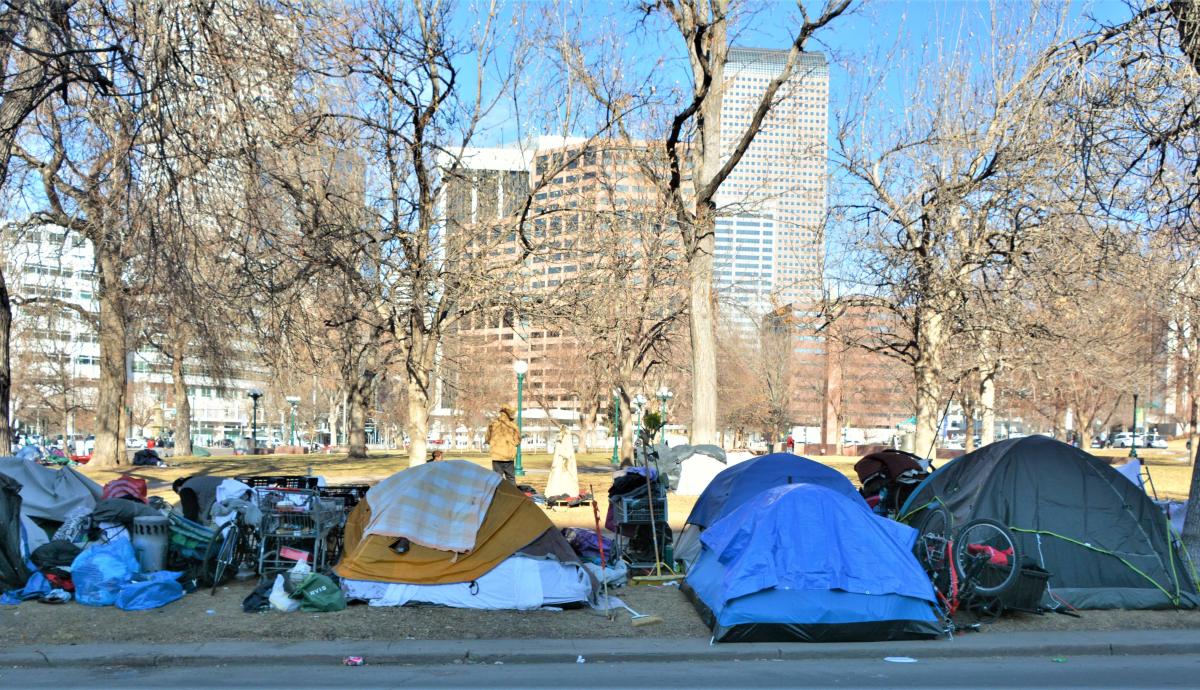DU Research Center Releases Denver Basic Income Project Report

Unhoused people and their tents in downtown Denver.
The University of Denver’s Center on Housing and Homelessness Research (CHHR) has released the first findings in its research partnership with the Denver Basic Income Project (DBIP).
The qualitative mid-term report, which was published in June, details the stories of some of the unhoused people involved in the study.
“It's pretty straightforward to say, well, ‘We want numbers to tell our story.’ But we also want depth and stories—intricacy—rather than just generalizations or ideas about how the ‘average’ happened,” says Daniel Brisson, a professor in DU’s Graduate School of Social Work and the director of CHHP. He’s also the principal investigator on the study.
The 12-month project follows 804 participants who are experiencing homelessness. The participants are split into three groups, A, B and C, and are given varying amounts of cash.
Based on whichever group they’re sorted into, each participant receives one of three distributions of money: Group A receives 12 monthly cash payments of $1,000 over the span of a year, totaling $12,000; Group B receives an initial deposit of $6,500 and 11 monthly cash payments of $500, totaling $12,000; and Group C receives 12 monthly cash payments of $50, totaling $600.
Researchers interviewed 24 participants, some from each group, at month three or month four of the study.
The report found that participants used the distributed cash to prioritize their hierarchy of needs, covering transportation and hygiene costs as well as catching up on bills and using additional funds to make bigger life changes like purchasing a car.
“I have gotten into some housing, and it's helped me a lot with doing that to help me pay off a lot of my debt,” a Group B participant said.
Stephanie Locke is a doctoral social work student and a research assistant with CHHR. She contributed to the mid-term report and was pleased with the results of the surveys.
“I think there's an expectation that people who are experiencing homelessness, if they aren't monitored with their spending, they may be frivolous with it,” Locke says. “But I was happy to see that our data showed that they are using it to thrive and meet their basic needs.”
Though researchers noted differences in the participants’ responses based on the levels of cash distribution they received, Bisson says there were two marked recurring themes: A sense of gratitude for being chosen to participate in the project and a desire to spend some of the distributed funds on people other than themselves.
“One of the things that I find is that when given money, what [people living in poverty] really want to do is give it away,” he says. “That's a really vital part of—now I'm just hypothesizing and theorizing—part of the human condition, how important it is for people to be generous, to want to give to others when they see it. When you don't have a lot of money, you don't have those same opportunities.”
The report states that early findings “demonstrate that there are significant benefits for people experiencing homelessness in receiving unconditional cash transfers,” but Brisson warns against drawing broad conclusions about the research this early in the project.
“I really do want to be clear that these are early results, particularly because as we see in my field, social work and intervention research, that the impact on people changes over time, with some significance,” he says. “And one of the things we really want to see is, does the impact hold over time.”
Researchers with CHHR and DBIP are just now beginning to conduct 10-month interviews with participants, and the team will be releasing a quantitative report sometime this fall that will provide a picture of how participants were doing at the halfway mark of the project.
Brisson says he anticipates that report will be important to people with the power to make change in Denver’s policies about homelessness.
“I think, particularly for policymakers who have their eyes on the Denver Basic Income Project, understanding on average how participants are doing when they receive $1,000 a month; or whether they received a lump sum of $6,500; or whether they're in the active control condition; how they did on average after six months, is something they're interested in,” he says.







